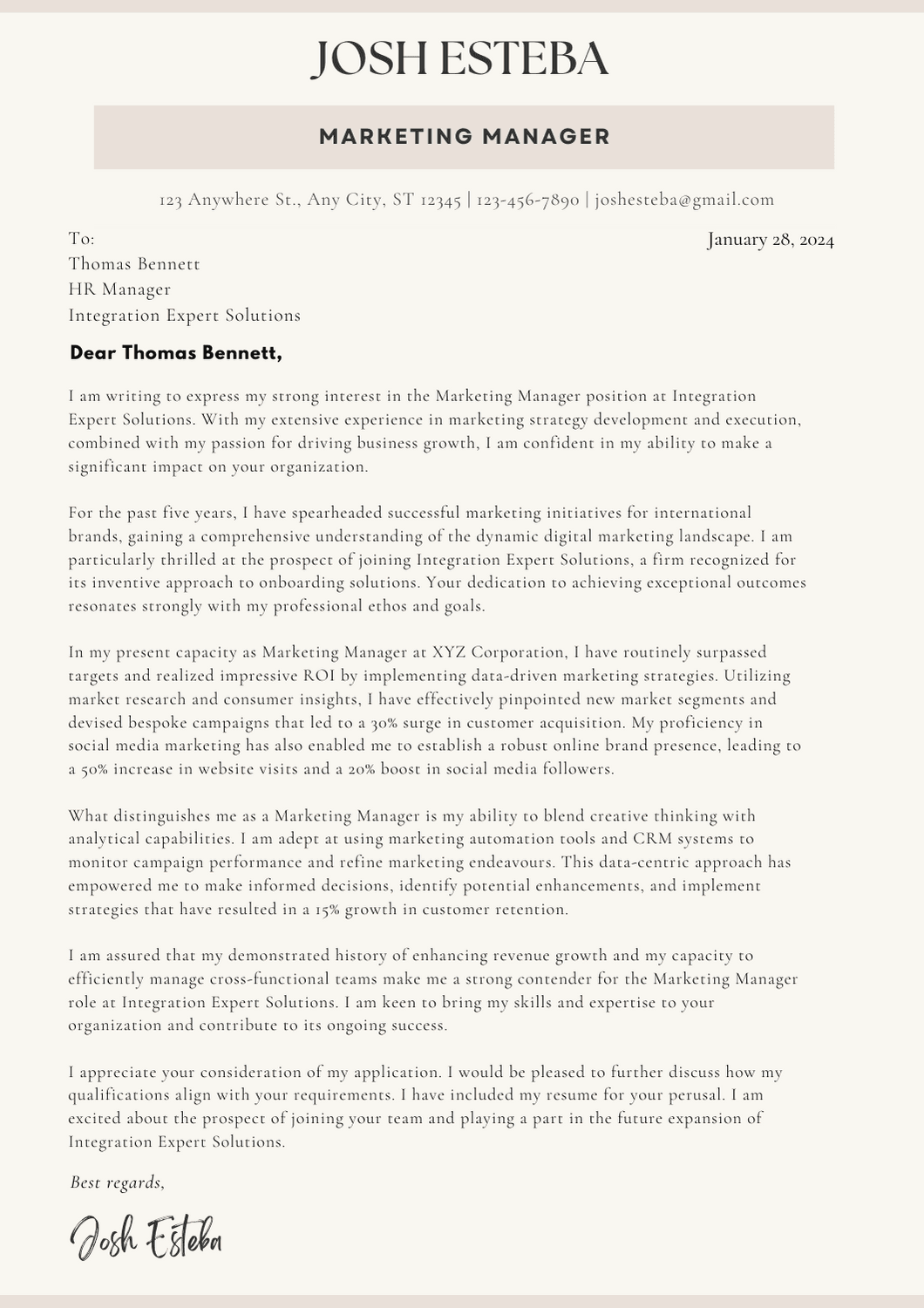As we navigate the job market in 2024, an age-old question persists - are cover letters necessary? You might find yourself grappling with this question as you painstakingly refine your resume and send out numerous applications. The thought of an extra document might seem daunting, especially when it's unclear if hiring managers even have the time to read it.Yet, cover letters offer you an invaluable opportunity to sell yourself before the hiring manager gets to your resume. It's a chance to explain why you'd be the perfect fit for the job. While some recruiters believe cover letters are outdated due to modern recruiting techniques, others argue they are essential to complete the story of candidates’ professional backgrounds.This article will explore the relevance of cover letters in today's job market and help you decide the best course of action. If you are still wondering, "Do I really need to write a cover letter?" This blog post will clarify its purpose, why it's still important to some recruiters and hiring managers, and when it's acceptable to omit as well as include it. Let's roll in and solve this problem once and for all!
It allows you to present yourself in your own words to the hiring manager, clarify your reasons for applying, and showcase how the skills and experiences outlined in your resume can benefit the company and the role. It encompasses aspects such as your hobbies, character traits, accomplishments, capabilities, insights acquired during your professional journey, personal objectives, passions, and ambitions.
This custom-made letter, which should be uniquely tailored for each role you apply for, supplements your resume by revealing your personality and indicating why you’re a suitable match for the job.
It provides the recruiter with an initial glimpse of the qualifications that make you a viable candidate for the role. Including a cover letter, even when not explicitly asked for, indicates your seriousness about the job and assists in distinguishing you from other applicants.
Here's an example of how a cover letter should be structured:
Here are several scenarios where including a cover letter with your application is beneficial:
On the contrary, it can significantly enhance them. The more crucial and desired the role is to you, the more effort you should invest in crafting a compelling, authentic, and persuasive cover letter.
Here are the circumstances in which you should consider not including a cover letter with your job application:
So just keep in mind to always tailor your approach to meet the specific demands of each job opportunity. By tailoring your application strategy to each role, you can better position yourself for success in your job search.
In fact, the opposite is often true. The additional effort and time you spend to write a cover letter can actually make your application stand out from the rest. It provides an opportunity for you to showcase your skills, qualifications, and passion for the role in a more detailed and personalized manner.
A cover letter serves as a powerful tool to augment the details listed on your resume. It allows you to further explain your skills, experiences, and capabilities, as well as express your enthusiasm for the role and the organization.
In this letter, you have the chance to clearly articulate why you believe you are the ideal candidate for the position, thereby significantly increasing your chances of landing the desired internship.
For individuals who are relatively new to the professional world and therefore have less work experience, a cover letter can serve as a spotlight that illuminates other notable elements such as your academic achievements, participation in extracurricular activities, and transferable skills that could be relevant to the position.
It can also highlight any volunteer experiences, demonstrating your willingness to contribute and be an active participant in your community. It's an opportunity to not only list your qualifications but to bring them to life, providing context and examples that demonstrate why you're the best fit for the position.
Are you still unsure about crafting a cover letter for your internship application from ground zero? This guide will provide you with all the necessary information!
This ensures you're competing on the same level as the top candidates, who will undoubtedly seize the opportunity to submit a cover letter given the choice. So, this opportunity should not be missed!

What Is a Cover Letter?
A cover letter is a single-page document that accompanies your resume during a job application. It generally consists of three to four concise paragraphs and functions as a persuasive pitch demonstrating why you are the ideal candidate for the position.It allows you to present yourself in your own words to the hiring manager, clarify your reasons for applying, and showcase how the skills and experiences outlined in your resume can benefit the company and the role. It encompasses aspects such as your hobbies, character traits, accomplishments, capabilities, insights acquired during your professional journey, personal objectives, passions, and ambitions.
This custom-made letter, which should be uniquely tailored for each role you apply for, supplements your resume by revealing your personality and indicating why you’re a suitable match for the job.
It provides the recruiter with an initial glimpse of the qualifications that make you a viable candidate for the role. Including a cover letter, even when not explicitly asked for, indicates your seriousness about the job and assists in distinguishing you from other applicants.
Here's an example of how a cover letter should be structured:

Is a Cover Letter Necessary in 2024?
Cover letters play a significant role in the recruitment process and are generally still considered relevant. Their importance is underscored by the fact that writing a well-structured and concise cover letter can set you apart from the competition. It provides an opportunity for candidates to elaborate on their skill set and previous work experience and demonstrate how they bring unique value to the role. This is also your only chance to make a compelling case about why you fit the company’s culture and show that you are willing to go the extra mile. According to a recent survey by Resume Genius, 68% of US hiring managers rate cover letters as important when deciding whether to invite an applicant for an interview. Cover letters show that you’re ready to take the initiative and put in the extra effort. Additionally, a 2023 study by recruitment website Zippia revealed that more than a fourth (26%) of recruiters always read cover letters and think they're an important component of the hiring decision. Almost half (45%) of recruiters say that not having a cover letter could get your job application rejected. Therefore, even if a cover letter isn’t mandatory, it’s advisable to include one in most cases unless job listings specifically state that cover letters are not required.To sum up, writing a polished, professional cover letter adds value to your application package, and more value usually means more opportunities. Thus, if you're questioning the relevance of a cover letter in 2024, the general agreement is that it's still essential. It's a critical element of a job application that could potentially improve your chances of securing an interview.When Should You Include a Cover Letter with Your Application?
In the landscape of job applications, cover letters serve as a vital bridge between a candidate's resume and the narrative of their career journey. Despite the evolution in job application processes, cover letters still hold significance in certain contexts.Here are several scenarios where including a cover letter with your application is beneficial:
Manifesting Your Competence: A well-articulated cover letter can serve as a testament to your competence, especially in communication and writing. This is particularly important for roles where these skills are inherent to job performance.
Job Referrals: If you were fortunate enough to be referred to a job opportunity by an existing employee at the company or have a personal history that correlates with the role, a cover letter serves as an excellent platform to make this connection known and to effectively pitch yourself for the position. Make sure to mention this in your cover letter. A personal referral can enhance your application, so don't miss the opportunity to include it.
For First-time Job Seekers: If you are just starting your career journey and do not have any previous job experiences to include on your resume, use your cover letter to highlight transferrable skills and explain why you believe you would be a good fit for the role. This can be extremely beneficial.
Addressing Gaps in Your Resume: If your resume doesn't fully convey your qualifications or unique career transitions, a cover letter can add colour, depth, and context, helping the hiring manager see beyond the bullet points of your resume. It gives you the chance to tell a story that the resume does not fully encapsulate.
Navigating Career Gaps or Changes: If you're transitioning between industries or overcoming challenges in your career paths, cover letters can be a useful tool to explain these changes or gaps. They provide a narrative framing these situations as growth opportunities rather than setbacks.
Expressing Genuine Enthusiasm: A well-crafted cover letter can convey your enthusiasm for the role and the company, demonstrating a genuine interest. It's a space to express genuine interest and how your own values align with the organization's mission, helping you to resonate more with potential employers.
Standing Out in the Shortlisting Process: A compelling cover letter can make you stand out in a highly competitive job market. It presents an opportunity to connect personally with the hiring manager, highlighting why you are the ideal fit for the role.
Demonstrating Your Initiative: A cover letter shows that you've put in the extra effort, indicating your sincere interest in the role. A well-crafted cover letter shows employers that you are proactive, engaged, and genuinely interested in the opportunity. It also provides a platform to express your passion for the industry, company, and role.
Storytelling and Highlighting Achievements: Your cover letter offers a glimpse into your career journey, emphasizing significant accomplishments, experiences, and abilities that your resume may not fully encapsulate.
Sharing Additional Information: If the job you're interested in requires residency in a specific region (for example, a particular coast), and you're currently living elsewhere but willing to relocate, mention this in your cover letter. This can prevent your application from being prematurely dismissed due to your current location. Your cover letter is an opportunity to clarify this point, particularly if it adds significant value to your application.
Providing Additional Insight into Your Qualities: Cover letters allow you to showcase your soft skills, such as communication, leadership, and problem-solving, which may not be immediately apparent on your resume. By providing context to their achievements and experiences, applicants can demonstrate how they align with the company's goals and culture.It's important to remember that a well-written, flawless, and personalized cover letter will never hurt your chances of securing an interview.
On the contrary, it can significantly enhance them. The more crucial and desired the role is to you, the more effort you should invest in crafting a compelling, authentic, and persuasive cover letter.
When Should You Not Include a Cover Letter with Your Application?
While cover letters can be a beneficial addition to job applications, they may not always be necessary or advantageous. There are certain circumstances where it might be best to forego them.Here are the circumstances in which you should consider not including a cover letter with your job application:
The job posting doesn't require one: If the job description explicitly states that a cover letter is not required, it's advisable to respect these instructions. Ignoring this directive and including one anyway might be perceived as a failure to adhere to the provided guidelines, which could reflect poorly on your application.
Lack of time for customization: Submitting a generic or poorly written cover letter can do more harm than good. If you're applying to multiple jobs and don't have the time to tailor a separate cover letter for each application, it might be more beneficial to omit including one rather than risk sending a subpar cover letter.
No upload option on the application platform: If the online job application platform doesn't provide a section or space to upload a cover letter, it's typically an indication that a cover letter isn't necessary for that specific role. In such cases, it's best to focus on other elements of the application.
Tech and other fast-paced industries: In industries where technical skills and portfolios take precedence over traditional application materials, a cover letter might be overlooked. Companies in these sectors often value concise, direct evidence of skills and accomplishments, which can be more effectively demonstrated through a resume or digital portfolio.
High-volume or automated screening processes: For positions where automated systems screen applications before being reviewed by human eyes, it's important to focus on optimizing the resume for keywords and clarity. In these scenarios, a cover letter might not be reviewed and could divert time from enhancing the resume, which is the document most likely to be considered.
Poor writing skills: If writing is not your strong suit and you don't have anyone to assist you with writing or editing, it's better to avoid including a cover letter. A poorly written cover letter, especially one with grammatical errors, could create a negative first impression and discourage recruiters from considering you for the job.
Recruitment agencies: If you're working with a recruitment agency, a cover letter might not be necessary. Often, recruiters will speak to candidates directly to gather the information they need and will then present this information alongside your resume to potential employers.Knowing when to include a cover letter and when to prioritize other aspects of your application, such as your resume or portfolio, is key to a successful job search.
So just keep in mind to always tailor your approach to meet the specific demands of each job opportunity. By tailoring your application strategy to each role, you can better position yourself for success in your job search.
Frequently Asked Questions about Cover Letters

Q1. Could a Cover Letter Diminish Your Opportunities?
Adding a cover letter to your job application will not diminish your chances of securing the position. It's important to note that hiring managers or recruiters do not typically dismiss applications simply because they are accompanied by a cover letter.In fact, the opposite is often true. The additional effort and time you spend to write a cover letter can actually make your application stand out from the rest. It provides an opportunity for you to showcase your skills, qualifications, and passion for the role in a more detailed and personalized manner.
Q2. Is a Cover Letter Necessary for an Internship?
When applying for internships, it's widely accepted and highly recommended to accompany your application with a cover letter. This is especially beneficial for candidates who are just embarking on their professional journey, such as recent college graduates or those who have yet to accumulate extensive job experience.A cover letter serves as a powerful tool to augment the details listed on your resume. It allows you to further explain your skills, experiences, and capabilities, as well as express your enthusiasm for the role and the organization.
In this letter, you have the chance to clearly articulate why you believe you are the ideal candidate for the position, thereby significantly increasing your chances of landing the desired internship.
For individuals who are relatively new to the professional world and therefore have less work experience, a cover letter can serve as a spotlight that illuminates other notable elements such as your academic achievements, participation in extracurricular activities, and transferable skills that could be relevant to the position.
It can also highlight any volunteer experiences, demonstrating your willingness to contribute and be an active participant in your community. It's an opportunity to not only list your qualifications but to bring them to life, providing context and examples that demonstrate why you're the best fit for the position.
Are you still unsure about crafting a cover letter for your internship application from ground zero? This guide will provide you with all the necessary information!
Q3. Is a Cover Letter Necessary for a Part-Time Job?
Although a cover letter might not always be explicitly required, including one can greatly enhance your profile, making you stand out among other applicants.Part-time work, despite having fewer working hours, should be treated with the same level of professionalism and seriousness as full-time roles. It's essential to approach the application process with a mindset geared towards success.Moreover, it is also a useful tool to highlight your unique skills and experiences. It provides more depth and context than a resume, allowing you to delve into details about your qualifications and what sets you apart as a candidate. Therefore, including a compelling cover letter with your resume is highly recommended when applying for both full-time and part-time positions. This is unless the job posting specifically instructs otherwise.Q4. Is Writing a Cover Letter for Every Job Necessary?
The importance of a personalized cover letter cannot be overstated. It remains a vital component of most job applications. The degree to which you choose to customize your cover letter is a personal decision and may heavily depend on how passionately you desire the role. It's crucial to ensure that your cover letter is tailored to the job you're applying for, highlighting why your skills and experiences make you the ideal candidate.However, it's really important to bear in mind that hiring managers, with their extensive experience and trained eyes, can easily identify a generic, non-specific cover letter. Therefore, taking the time to personalize your cover letter can make all the difference between standing out and getting lost in the pile of applications.Q5. What To Do When a Cover Letter is "Optional"
Even when a job posting states that a cover letter is "optional", it's in your best interest to include one. The act of submitting a cover letter, even when not explicitly required, demonstrates a level of initiative and dedication that can set you apart from other applicants.This ensures you're competing on the same level as the top candidates, who will undoubtedly seize the opportunity to submit a cover letter given the choice. So, this opportunity should not be missed!
